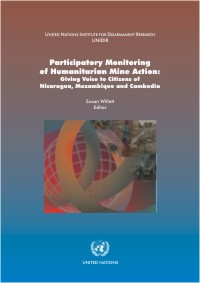Since its entry into force on 1 March 1999, the Mine Ban Treaty (MBT) has been tremendously successful in attaining its aim of abolishing anti-personnel landmines. In the past few years there has been a drastic decline in the number of mine producers, an almost complete end to the trade in mines, widespread elimination and destruction of stockpiled mines, an increasing amount of land cleared of mines and fewer new mine victims.
Nevertheless, despite the remarkable progress towards the eradication of antipersonnel mines, the assistance of landmine victims, another goal sanctioned by the MBT, has remained a largely neglected aspect of the implementation of the Treaty. This failing may be partially explained by the weakness of existing formal monitoring mechanisms that are unable to fully apprehend the needs and circumstances of mine affected communities. Commonly, mine affected communities have very little recourse in the formulation, prioritisation, implementation, monitoring and evaluation of mine action programmes despite the enormous importance that such programmes evidently have for them. As a consequence, in many afflicted countries, too few resources have been devoted to the task of alleviating the human grief caused by mines and those that have, have not necessarily been put to best use.
In Participatory Monitoring of Humanitarian Mine Action: Giving Voice to Citizens of Nicaragua, Mozambique and Cambodia, Susan Willett, Hildegard Scheu and Chris Dammers, explore the possibility of adopting participatory monitoring techniques on a trial basis in three of the most heavily mine affected countries in the world: Nicaragua, Mozambique and Cambodia. Participatory monitoring and evaluation techniques, argue the authors, can strengthen the monitoring and verification of the implementation of victim assistance programmes and thus lead to an improvement in the condition of mine casualties. Such techniques, which draw on the first-hand involvement and knowledge of the affected populations, promise to foster a better match between mine victim aid policies and mine victim needs, enhance the rehabilitation of mine affected communities and empower these to break out of traditional patterns of dependency.
Citation: Susan Willett (ed.) (2003). "Participatory Monitoring of Humanitarian Mine Action: Giving Voice to Citizens of Nicaragua, Mozambique and Cambodia", UNIDIR, Geneva.
